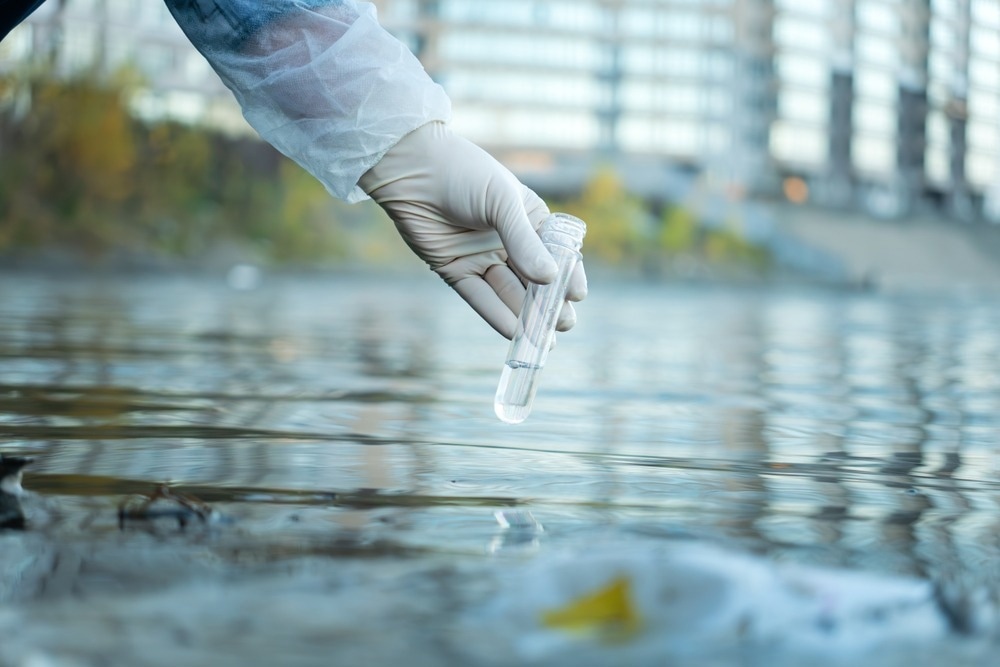Reviewed by Danielle Ellis, B.Sc.Sep 13 2024
According to a study published in Carbon Future on September 5th, 2024, chemists at Yale University and their colleagues have developed an electrochemical catalyst and membrane that provides an efficient and sustainable method for treating water contaminated with trichloroethylene (TCE), a common and persistent environmental pollutant.
Some chemicals cause environmental issues; others, thankfully, can help clean them up.
Their findings emphasize the potential for enhanced electrochemical treatments in environmental remediation and pave the way for future advances in the sector.

Image Credit: Melnikov Dmitriy/Shutterstock.com
TCE is a popular industrial solvent or cleaning product for refrigerants, dry cleaning, and metal and electronic degreasing. However, TCE's toxic characteristics can impair various organs and cause cancer. Water pollution from TCE is not uncommon.
While bioremediation was one of the first approaches to combating TCE contamination, it is often inefficient and produces even more hazardous byproducts. Chemical cleanup is faster and more efficient; however, it frequently needs powerful chemicals and does not entirely degrade TCE.
As a result, electrochemical therapy, which employs electrical currents to break down toxins, is developing as a more effective and long-term alternative for TCE remediation.
Electrochemical methods have shown promise for treating water contaminated by chlorinated volatile organic compounds, but efficiently removing and repurposing TCE has been a challenge due to the lack of effective catalysts.
Hailiang Wang, Study Lead Corresponding Author and Professor, Department of Chemistry and Energy Sciences Institute, Yale University
To meet this demand, the study team created a catalyst made of cobalt phthalocyanine (CoPc) molecules placed on multiwalled carbon nanotubes (CNTs). This catalyst degrades TCE at an unprecedented pace, converting it into ethylene and chloride ions with about 100% Faradaic efficiency. This implies that practically all of the electrical current is used to convert TCE into innocuous products while creating no harmful byproducts, making it promising for practical usage.
The key to our success is the first electron transfer step, which doesn’t involve protons, and the single site nature of our catalyst. These helped us avoid the hydrogen evolution reaction and thereby promote TCE dechlorination.
Yuanzuo Gao, Study First Author and Graduate Student, Yale University
The hydrogen evolution reaction is a side reaction that consumes electrons that could have been utilized to break down contaminants, reducing the process's current efficiency.
To improve the practical application of this catalyst, the researchers integrated CoPc molecules into an electrified membrane formed of reduced graphene oxide (rGO), a modified version of graphene recognized for its strength, lightweight nature, and high conductivity. This membrane filtration system removed 95% of TCE from simulated water samples that mimicked actual water treatment settings, representing a substantial step forward in the technology's practical use.
Gao concluded, “By combining CoPc molecules with CNT and rGO supports, we have created highly selective and active electrocatalysts for the treatment of TCE in water.”
This study emphasizes the ability of modern electrochemical technologies to meet difficult environmental concerns and propel advances in water treatment and industrial pollution management.
Journal Reference:
Gao, Y., et al. (2024) Effective electrochemical trichloroethylene removal from water enabled by selective molecular catalysis. Carbon Future. doi.org/10.26599/CF.2024.9200015